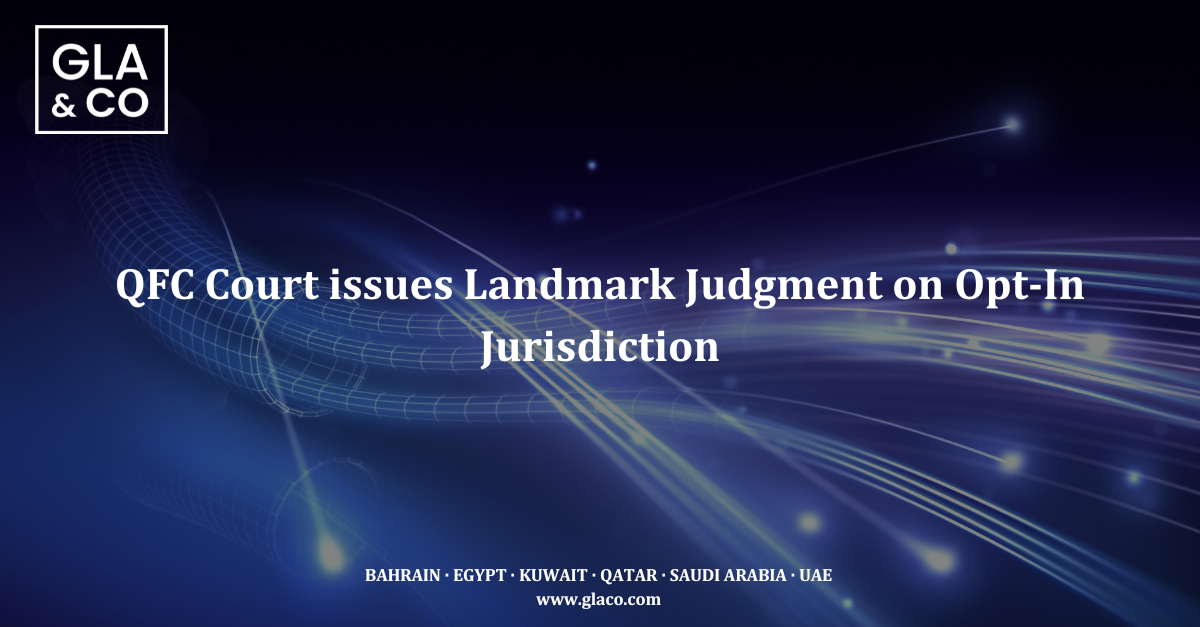
QFC Court issues Landmark Judgment on Opt-In Jurisdiction
Overview
The Appellate Division (Lord Thomas of Cwmgiedd, President, and Justices Sir William Blair and Dr Hasan Al-Sayed) of the Qatar Financial Centre Civil and Commercial Court recently handed down a landmark decision in University of Cambridge v The Holding WLL (2025). The Court’s decision, dated 29 April 2025, provides valuable clarity on the jurisdiction of the QFC Court, specifically in connection with the concept of “opt-in jurisdiction”.
Summary
The Court declined to exercise jurisdiction in a contractual dispute where the parties clearly expressed their intention to submit disputes to the QFC Court. The appellate ruling, confirming the earlier jurisdictional ruling of the QFC’s First Instance Circuit (although on substantially different grounds), masterfully addresses a number of important legal topics, including the hierarchy of legislation in Qatar and the role of the QFC Court.
The parties to the dispute were a prominent English university (a UK legal person), and a holding company incorporated in the State of Qatar under the Ministry of Commerce and Industry (not the Qatar Financial Centre). In the underlying agreement, the parties freely agreed to a dispute resolution clause under which (a) the substantive laws of the State of Qatar would apply, and (b) the QFC Court would enjoy exclusive jurisdiction.
Despite the clear dispute resolution clause, the Court rejected jurisdiction. The Court’s reasoning noted that—despite the contractual provision otherwise—the Court was under no legal obligation (and, indeed, had no power) to accept jurisdiction.
The Court explained that it (and the QFC itself) are a creation of primary legislation of the State of Qatar. These laws can be described as falling under a hierarchy, organized as follows:
- The Constitution (Fundamental law)
- Primary Legislation (Primary law) – made by the Shura Council, the country’s legislative body, and ratified by the Emir, in accordance with the Constitution
- Regulations (Subsidiary or Secondary legislation) – made under delegated powers provided for in primary legislation and ratified by the Emir
The QFC Court acknowledged that secondary legislation appeared to give the QFC jurisdiction over the present case[1], but that the relevant secondary legislation contradicted the limits set out in the relevant primary legislation and could thus be disregarded. This finding illustrates the concept of “judicial review”, which is a hallmark of constitutional law, as embodied in the famous US Supreme Court case Marbury v Madison (1803).
The QFC Court effectively puts all parties on notice that it is not—unlike some other regional commercial courts—an “opt-in” jurisdiction where contracting parties with no connection to the QFC, or indeed the State of Qatar, can simply bind the Court to exercise jurisdiction to their disputes. A QFC Court governing law/jurisdiction provision in a contract is no guarantee that the QFC Court will actually exercise jurisdiction. Instead, parties should focus on the five key factors set out in the QFC Law (Law No. 7 of 2005, as amended), namely (article 8(3)(c)):
- Transactions taking place in or from the QFC between QFC entities.
- Disputes involving QFC authorities and QFC entities.
- Disputes between QFC entities and employees thereof.
- Disputes between QFC entities, on the one hand, and residents of the State of Qatar, on the other hand; or Disputes between entities established in the State of Qatar (but outside the QFC).
- Disputes where the QFC Court is given jurisdiction pursuant to a law (i.e. primary legislation)[2].
The one caveat to the principle that the QFC Court is not an “opt-in” court is that the QFC Court may act as the Competent/Supervisory Court for any arbitration seated in Qatar. It may do so as this power was given to it under primary legislation[3].
The Appellate Division further clarified that the State Courts of Qatar are the “default” court in the country and that the QFC Courts only have narrow jurisdiction in accordance with relevant law
Impact
The Court’s ruling may have far-reaching implications, in both the contentious and non-contentious world.
Corporate lawyers and their clients may now have to reconsider the enforceability of governing law provisions in thousands of contracts that have expressly consented to the jurisdiction of the QFC Court. Unless the underlying agreements meet one of the 5 specific jurisdictional criteria under primary legislation, it is entirely possible that disputes under those contracts would be resolved not by the QFC Court, but rather by the State Courts of Qatar—or elsewhere.
For more information, please contact Dean Jaloudi, Partner and Head of GLA’s Qatar Office.
The full text of the Court’s judgment can be found here: https://www.qicdrc.gov.qa/judgments/ctfic00362024-chancellor-masters-and-scholars-university-cambridge-v-holding-wll
Authors: Dean Jaloudi, Partner, May El Mahdy, Senior Associate and Jehan Saleh, Associate.
[1] Article 9.2 of the Regulations and Procedural Rules of the QFC Courts provides that “the Court will take into account the expressed accord of the parties that the Court shall have jurisdiction.”
[2] For example cases involving the Qatar Free Zones
[3] The Arbitration Law of the State of Qatar (Law no. 2 of 2017)

